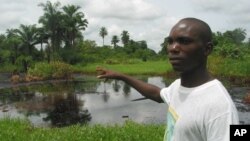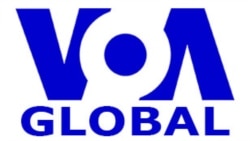A Nigerian diaspora group in the United States said a committee of the U.S. House of Representatives has agreed to hold a hearing next month on the situation in Ogoniland and the oil-rich Niger Delta region.
The group, the Council of Ogoni Professionals International, also said the Congress has drafted a concurrent resolution describing the Niger Delta as one of the world’s important wetlands that must be protected and economic development made a priority.
Council member Anslem John-Miller said the hearing is possible through his group’s quiet diplomacy and advocacy.
“You are very aware of the fact that on August 4, 2011, the UN Environment Program [UNEP] released a report on Ogoni and, up to this moment, nothing has been done. So, we are going to be discussing all that and the overall situation in the Niger Delta,” he said.
The report said the Niger Delta’s drinking water supplies and agricultural land have been damaged by 50 years of oil spills. It said the cleanup could cost more than $1 billion.
“The clean-up of Ogoniland will not only address a tragic legacy, but also represents a major ecological restoration enterprise with potentially multiple positive effects ranging from bringing the various stakeholders together in a single concerted cause to achieving lasting improvements for the Ogoni people," said Achim Steiner, U.N. undersecretary-general and UNEP executive director.
Miller said he has been invited to testify at the upcoming congressional hearing. He said the hearing and the concurrent resolution on the Niger Delta were the result of quiet lobbying by his organization.
“The Council of Ogoni Professionals has been a very silent diplomat and [done] a lot of advocacy work on the issues of Ogoniland and what’s going on in Nigeria. So, you can see that we are fighting to ensure that justice is done to Ogoni and the Niger Delta people,” Miller said.
Miller said the concurrent resolution is sponsored by Representatives Bobby Rush of Illinois and Jeff Fortenberry of Nebraska. He called on the Ogoni people throughout the United States to call their representatives in Washington and ask them to support the resolution.
To protest Royal Shell Oil company's destruction of their environment and what they see as the Nigerian government's indifference, the Ogoni people founded MOSOP, the Movement for the Survival of Ogoni People, in 1992, under the leadership of the late writer Ken Saro-Wiwa.
In November 1995, nine MOSOP activists, among them Saro-Wiwa, were hanged by the government on charges of “incitement to murder.”
Miller expressed regret for the current ongoing sectarian violence in Nigeria. He called on President Goodluck Jonathan to take decisive action in dealing with the situation.
“It is very sad that Christians and Muslims are engaged in this kind of bloodletting. But, at the same time, I think it is time for the president to be decisive on the sponsors of Boko Haram,” Miller said.
He also called on Jonathan to involve Nigeria’s different nationalities.
“It is time to call a national conference; let the ethnic nationalities sit down eyeball to eyeball and discuss how we [can] live together,” Miller said.
The group, the Council of Ogoni Professionals International, also said the Congress has drafted a concurrent resolution describing the Niger Delta as one of the world’s important wetlands that must be protected and economic development made a priority.
Council member Anslem John-Miller said the hearing is possible through his group’s quiet diplomacy and advocacy.
“You are very aware of the fact that on August 4, 2011, the UN Environment Program [UNEP] released a report on Ogoni and, up to this moment, nothing has been done. So, we are going to be discussing all that and the overall situation in the Niger Delta,” he said.
The report said the Niger Delta’s drinking water supplies and agricultural land have been damaged by 50 years of oil spills. It said the cleanup could cost more than $1 billion.
“The clean-up of Ogoniland will not only address a tragic legacy, but also represents a major ecological restoration enterprise with potentially multiple positive effects ranging from bringing the various stakeholders together in a single concerted cause to achieving lasting improvements for the Ogoni people," said Achim Steiner, U.N. undersecretary-general and UNEP executive director.
Miller said he has been invited to testify at the upcoming congressional hearing. He said the hearing and the concurrent resolution on the Niger Delta were the result of quiet lobbying by his organization.
“The Council of Ogoni Professionals has been a very silent diplomat and [done] a lot of advocacy work on the issues of Ogoniland and what’s going on in Nigeria. So, you can see that we are fighting to ensure that justice is done to Ogoni and the Niger Delta people,” Miller said.
Miller said the concurrent resolution is sponsored by Representatives Bobby Rush of Illinois and Jeff Fortenberry of Nebraska. He called on the Ogoni people throughout the United States to call their representatives in Washington and ask them to support the resolution.
To protest Royal Shell Oil company's destruction of their environment and what they see as the Nigerian government's indifference, the Ogoni people founded MOSOP, the Movement for the Survival of Ogoni People, in 1992, under the leadership of the late writer Ken Saro-Wiwa.
In November 1995, nine MOSOP activists, among them Saro-Wiwa, were hanged by the government on charges of “incitement to murder.”
Miller expressed regret for the current ongoing sectarian violence in Nigeria. He called on President Goodluck Jonathan to take decisive action in dealing with the situation.
“It is very sad that Christians and Muslims are engaged in this kind of bloodletting. But, at the same time, I think it is time for the president to be decisive on the sponsors of Boko Haram,” Miller said.
He also called on Jonathan to involve Nigeria’s different nationalities.
“It is time to call a national conference; let the ethnic nationalities sit down eyeball to eyeball and discuss how we [can] live together,” Miller said.






